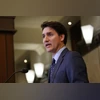Canadian Opposition leader and Conservative Party chief Pierre Poilievre on Wednesday challenged Prime Minister
Justin Trudeau to release the names of his party members whom the latter claimed were involved in foreign interference in Canadian politics.
Trudeau made the remarks on Wednesday, while speaking before the Foreign Interference Commission, which is investigating the role of foreign actors in Canada's federal elections. Appearing before the independent commission, Trudeau suggested that Canadian intelligence agencies had information that a number of Conservative politicians are "engaged" in or at risk from foreign interference attempts.
However, Canada's Global News reported that Trudeau admitted that the list of names also included Liberal politicians, as well as those from other parties. Trudeau did not expand on what the parliamentarians being referred to were suspected of doing.
Trudeau also took aim at Poilievre for refusing top secret briefings on the national security threat that has allegedly penetrated his party.
The development comes after India's diplomatic ties with Canada hit a fresh low on Monday, following New Delhi's decision to withdraw its High Commissioner, Sanjay Kumar Verma, along with other diplomats and officials, from the country. New Delhi also expelled six Canadian diplomats, including Acting High Commissioner Stewart Ross Wheeler.
The escalation came after Ottawa conveyed to New Delhi its intention to question Indian diplomats and officials as part of its investigation into the killing of Khalistan separatist Hardeep Singh Nijjar last year. Continuing to reject Ottawa's allegations, India said that Trudeau's government had been targeting its representatives for "vote bank politics".
After Trudeau testified before the commission, the Ministry of External Affairs on Thursday said what it heard only "confirms" India's consistent stand that Canada has "presented us no evidence" in support of the serious allegations Ottawa chose to level against India and Indian diplomats.
On Wednesday, Trudeau acknowledged that he had only intelligence and no "hard evidentiary proof" when he alleged the involvement of Indian government agents in the killing of Nijjar.
Poilievre says Trudeau is fabricating allegations
For his part, Poilievre has accused Trudeau of fabricating the allegations to distract from internal struggles within his Liberal Party, claiming that the Prime Minister had failed to prevent foreign interference from influencing elections.
Poilievre's response comes after a Member of Parliament (MP) from Trudeau's Liberal Party on Wednesday publicly called on the Prime Minister to step down as party leader, becoming the first party MP to do so, even as Canadian media reports said that other MPs were co-ordinating their efforts to force Trudeau out.
In his statement following Trudeau's testimony, Poilievre said: "He (Trudeau) is lying. He is lying to distract from a Liberal caucus revolt against his leadership and revelations he knowingly allowed Beijing to interfere and help him win two elections."
"As prime minister, privy to all this information, I have the names of several parliamentarians, former parliamentarians, and/or candidates in the Conservative Party of Canada who are engaged or at high risk of engaging in foreign interference," Trudeau told the commission.
Trudeau also took aim at Poilievre for refusing top secret briefings on the national security threat, which has allegedly penetrated his party.
Stating that he had directed Canada's intelligence agencies to inform Poilievre about the alleged foreign interference related to his party, Trudeau said, "The decision by the leader of the Conservative Party to not get those classified briefings means that nobody in his party, not him, and nobody in a position of power knows the names of these individuals and can take appropriate action."
According to Canadian media reports, Poilievre has argued that accepting such top-secret briefings would prevent him from asking questions about foreign interference in the Canadian Parliament.
In his statement, Poilievre shot back at Trudeau, calling on him to release the names of all the MPs that have "collaborated" with foreign governments.
"Furthermore, my chief of staff has received classified briefings from the government. At no time has the government told me or my chief of staff of any current or former Conservative parliamentarian or candidate knowingly participating in foreign interference," Poilievre's statement claimed.
Poilievre calls on Trudeau to make evidence public
Poilievre also stated that while he had been briefed by the Canadian Security Intelligence Service (CSIS) on Tuesday regarding foreign interference from India, he had not been informed of any involvement by MPs from his party. "At no time has the government told me or my chief of staff about any current or former Conservative parliamentarian or candidate knowingly participating in foreign interference,” Poilievre's statement read.
Poilievre added that if Trudeau has "evidence to the contrary, he should share it with the public". He added, "Now that he (Trudeau) has vaguely mentioned this during a commission of inquiry, he should release the facts. But he won't -- because he is making it up."
Accusing the Trudeau government of disregarding intelligence warnings, Poilievre claimed that they "sat on a CSIS surveillance warrant application for a Liberal power-broker for 54 days". He also alleged that Trudeau's government "willingly allowed the People's Republic of China (PRC) consulate" to transport international high school students to vote for Han Dong, a former Liberal Party MP for Don Valley North, who has been entangled in controversy regarding alleged foreign interference by China.
During the 2019 election in Canada, CSIS had reportedly briefed Liberal officials about "irregularities" in Dong's nomination as Don Valley North's Liberal Party candidate.
)